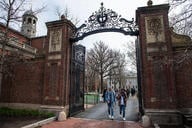You have /5 articles left.
Sign up for a free account or log in.
When Education Secretary Betsy DeVos announced she had withdrawn the Obama administration’s rules on investigating campus rape, her message rang clear: due process and fairness were paramount.
“The notion that a school must diminish due process rights to better serve the victim only creates more victims,” DeVos said last month in announcing the Education Department’s intent to revise the federal regulation on Title IX of the Education Amendments of 1972, the law prohibiting gender discrimination.
The Obama guidance on Title IX, issued in 2011 in the form of a Dear Colleague letter, has been attacked for creating hostile environments at colleges where overzealous administrators disregarded the rights of those accused of sexual assault. At the same time, many victims' advocates credit that letter with creating protections for survivors, saying that investigators had previously failed to properly find out what happened.
But some institutions don’t leave Title IX investigations or adjudication of sexual assault to college leaders or panels. Particularly since the 2011 letter, some have hired outside parties to do the work for them -- lawyers or other trained professionals to conduct the investigation, retired judges for disciplinary hearings.
It’s a move generally intended to eliminate any potential conflicts of interest and ensure professionals conduct the type of work that some institutions have sometime struggled to understand.
“Like many schools, we involve an outside investigator -- in our case, they are always paired with an internal investigator. This doesn’t appear to be a new or trending practice -- there are many models,” said Julie Jette, a spokeswoman for Brandeis University, a private institution in Massachusetts.
Djuna Perkins is a lawyer and former prosecutor based in Deadham, Mass., who has done this type of work for not only Brandeis, but Amherst College, Harvard University, Eastern Nazarene College, Mount Holyoke College and Wheelock College, among others.
Her practice, which specializes in these investigations, was established in 2012, shortly after the Dear Colleague letter -- and she’s been busy since.
Perkins said she’s found that most Massachusetts colleges successfully follow their own policies, which she sometimes reviews to make sure they match federal guidelines. The 2011 letter didn’t institute any unreasonable demands, she said, but sometimes colleges have found following them difficult.
Another lawyer, and a former member of Obama administration who requested anonymity to discuss these investigations (the lawyer is in the midst of one now) and Title IX candidly, said institutions have improved since 2011, but many still don’t meet the federal government’s requirements.
The lawyer said some colleges have simply borrowed their sexual harassment policies from their employee guide, but that those guidelines often mention nothing about the learning environment.
“Sometimes they’re just not catered to the educational setting,” the lawyer said.
Perkins said she offers institutions various training sessions -- one of her most popular being the standard of evidence by which to judge these cases and, essentially, when to stop collecting evidence. The evidentiary standard has served as a major political sticking point, with some activists believing it should be boosted from the “preponderance of evidence” standard that the Obama administration required colleges to use to “clear and convincing.”
The preponderance of evidence standard, which is also used for civil cases, means there’s a 50.1 percent chance that the accused is responsible; with clear and convincing, the threshold is closer to a 75 percent chance. New information from the Education Department now allows institutions to use either one.
With all the legal jargon, sometimes the public can confuse campus hearings with a courtroom, Perkins said. Survivor advocates and college administrators have often tried to make clear these types of proceedings aren’t criminal ones, and so in some ways, involving lawyers and judges could become problematic because their specialty lies in the judiciary system.
Laura Dunn, executive director of SurvJustice, a victim advocacy group, said she's had concerns about this approach. One institution, for instance, hired an ex-prosecutor who inquired into sexual history, which the Obama-era rules prohibits.
College leaders interviewed said they ask the professionals to whom they outsource the work to undergo training on trauma and the correct approach to working with victims and the accused.
Perkins said her background matches well -- at one point in her career she served as a civil litigator, and the way she opened up subjects was making them more comfortable, just as she does with the students she interviews during investigations.
“In the moment, when I’m in the room, it’s a conversation,” Perkins said. “I want to know what was going through your mind, your version of what happened, so I can best put it all together. If they’re not comfortable, they don’t give you enough information.”
Bentley University, also in Massachusetts, hires investigators and has been doing so since the 2014-15 academic year, said Andrew Shepardson, vice president for student affairs and dean of students.
At the private institution of a little more than 5,000 students, it’s advantageous to use someone without any connections to students, Shepardson said. Student panels that play a role in adjudicating cases at many colleges have been criticized for their potential conflicts of interest, with both the accusers and accused. The investigator gathers all the facts, looks at relevant documents and conducts interviews, and then submits to a hearing panel a conclusion of whether the investigator thinks sexual misconduct occurred. That panel makes the final decision.
Shepardson said that to avoid conflating the campus process with a trial, the university remains “student focused” at all times -- the leaders there care about their well-being, and the process involves conversations, not cross-examinations.
Shepardson said he would also recommend Bentley’s practices to other institutions.
“Our model, which is focused on fairness for all parties, uses external, unbiased experts to investigate very complicated situations,” Shepardson wrote in an email. “However, the final authority for determining if the investigation is complete, if rules were violated and what sanctions are appropriate rest with our own staff -- all of whom are specially trained on Title IX issues at Bentley.”
At Vassar College, where administrators call on hired retired judges to help run their Title IX hearings, they want to avoid any “smell of a courtroom,” said Rachel Pereira, the director of equal opportunity and affirmative action, and Vassar’s Title IX coordinator.
The college hires the judges from JAMS, known formally as Judicial Arbitration and Mediation Services. It interviews potential candidates then calls on them as needed if they fit what the university is looking for, Pereira said -- that they’re familiar with trauma and issues impacting adolescents.
Vassar’s proceedings are laid out much differently than a judge might be accustomed to -- students pick the location where they’re held, and time is allowed for breaks, Pereira said. Snacks are provided, too -- lemonade and cookies. The judge goes by their first name, not a formal title.
The college needs people versed in due process, and no one better than a judge understands those protections, Pereira said. After the judge -- Vassar pulls from a pool of three of them -- hears the case, they will make a recommendation that is either adopted or rejected by the dean of students.
“There’s a chance of perceived bias and just the general sense the discomfort of thereafter seeing that professor on campus,” Pereira said, in explaining why the college doesn’t use a panel of faculty and staff to adjudicate cases. “There’s greater confidentiality, and presumably an outside party will not have to interact with these students again.”
Pereira said she’s found this type of outsourcing to be successful -- it brings a sense of equity to both parties.
“Having adjudicators who understand their role here, engaging in our educational process, has definitely been a good experience,” she said. “We do not expect everyone to understand the process, and we do not call everyone who we’ve interviewed. There are some people who just don’t get it.”




